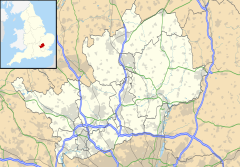Harpenden Urban District
| Harpenden | |
|---|---|
 Church Green in Harpenden Town Centre during Spring. |
|
| Harpenden shown within Hertfordshire | |
| Area | 4.93 sq mi (12.8 km2) |
| Population | 29,448 (2011) |
| • Density | 5,973/sq mi (2,306/km2) |
| OS grid reference | TL135145 |
| Civil parish |
|
| District | |
| Shire county | |
| Region | |
| Country | England |
| Sovereign state | United Kingdom |
| Post town | HARPENDEN |
| Postcode district | AL5 |
| Dialling code | 01582 |
| Police | Hertfordshire |
| Fire | Hertfordshire |
| Ambulance | East of England |
| EU Parliament | East of England |
| UK Parliament | |
| Website | Harpenden Town Council |
Harpenden is a town in the St Albans City district in the county of Hertfordshire, England. The town's population is just under 30,000. Harpenden is a commuter town, with a direct rail connection through Central London and property prices well over double the national average. Geographically it is located between (and a short distance from) two much larger neighbours: Luton town (to the north) and the city of St Albans (to the south). It is flanked by the villages of Redbourn (to the west) and Wheathampstead (to the east).
There is evidence of pre-Roman Belgic farmers in the area. In 1867 several items were found including a bronze escutcheon, rams-head shaped mounts, and a bronze bowl.
There are Roman remains in land around Harpenden, for instance the site of a mausoleum in the park at Rothamsted. A tumulus near the river Lea was opened in the 1820s and it contained a stone sarcophagus of Romano-Celtic origin. Five objects dating from around 150 AD, were inside including a glass jug with a Mediterranean stamp and samian ware dishes used for libations.
Up to the 13th century the area of the parish consisted of woodland with small hamlets and single farmsteads around cleared areas called "End" or "Green" and there are 19 Ends and 18 Greens in area of Harpenden and Wheathampstead parishes. Many of these still survive today.
Harpenden village grew out of Westminster Abbey's gradual clearing of woodland for farming and settlement within its Wheathampstead manor, granted by Edward the Confessor in 1060. A first reference to a parish church is in 1221 (where it is referred to as Harpendene) so it is inferred that the village grew up around then. The church of St Nicholas is the oldest church in the town, originally built as a Chapel of ease in 1217.
Just beyond the southern edge of the town lies Nomansland Common (sometimes simply called "No Man's Land") upon which part of the Second Battle of St Albans was fought during the Wars of the Roses. Nomansland Common also saw the first annually contested steeplechase in England, in 1830 when it was organised by Thomas Coleman, and the last fight of nineteenth century bare-knuckle fighter, Simon Byrne. It was also the haunt of the highwaywoman Lady Katherine Ferrers, better known as the "Wicked Lady".
...
Wikipedia

